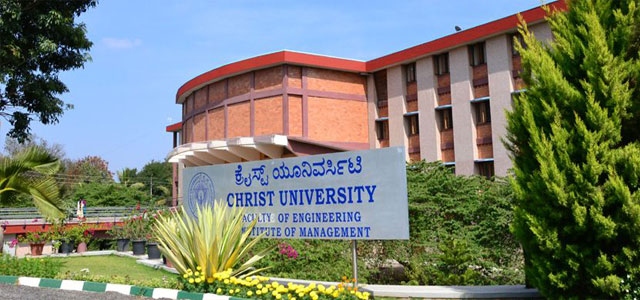CHRIST UNIVERSITY MSC DATA SCIENCE COURSE OVERVIEW
The postgraduate course focuses on the technical and practical aspects of data science and includes hands-on practical exposure in relevant domains and tools. It is an interdisciplinary subject involving electronics, mathematics, probability, and statistics. It covers topics related to the methodical and strategic analysis of structured and unstructured data and conversion of qualitative data into quantitative profit. Candidates will have diverse knowledge about the diverse applications of data mining, analytics, storage, programming, and algorithms after successful completion of the course.
The course aims to interlink the gap between IT industries and academics by incorporating the latest advancements, developments, research models, and industry standard applications of data science into the curriculum. The course is strengthened further by a strong academic foundation, experienced faculty, IT experts, excellent infrastructure, well-equipped laboratories, and essential facilities like super-fast connectivity and the latest software. The Placement Cell encourages fresh talent and provides multiple career opportunities in the top IT companies and organizations.
Candidates who take up the MSc Data Science course in Christ University Bangalore will have diverse knowledge about the multiple applications of data science and analytics to overcome current IT challenges.
Skills like project management, logical reasoning, team work, planning and execution, organization, analytical reasoning, decision-making are enhanced through tools like case studies, presentations, webinars, seminars, internships, projects, workshops, and guest lectures included in MSc Data Science in Christ University.
DURATION OF MSC DATA SCIENCE COURSE IN CHRIST UNIVERSITY
- 2 years (4 semesters)
- Full time, Postgraduate Programme
AFFILIATION & APPROVALS
- Government of India
- Deemed-to-be University
- Accredited by NAAC
- Approved by UGC
PROGRAM OBJECTIVES
- To provide a strong foundation in Statistics, Data Analysis, Data Mining, Machine Learning and its many applications
- To create graduates who can analyze real-time problems by applying various programming tools and techniques
- To provide practical experience and exposure so that candidates can design and develop immediate solutions for real-time business problems
- To provide an environment of adaptability and continuous learning
- To develop and enhance skills like handling, managing, analyzing and interpreting data
- To integrate the concepts of ethical, holistic, and human values to ensure quality research and develop solutions to social problems
PROGRAM OUTCOME OF CHRIST UNIVERSITY MSC DATA SCIENCE
- Graduates with the ability to understand and apply the fundamental concepts of Statistics, Data Analysis, Data Mining, Machine Learning and its many applications
- Graduates who can analyze real-time problems by applying various programming tools and techniques
- Graduates with the ability to design and develop immediate solutions to meet real-time business problems
- Graduates who can engage in adaptability and continuous learning through technological advancement
- Graduates who have excellent handling, managing, analyzing and data interpretation skills.
- Graduates who can integrate ethical, holistic, and human values to ensure quality research
ELIGIBILITY OF MSC DATA SCIENCE IN CHRIST UNIVERSITY
- Minimum 50% aggregate in BCA/Bachelor’s degree with Computer Science/Mathematics/Statistics subjects from a recognized Board in India
- Candidates with final semester/year examinations in March-May 2021 are eligible to apply
IMPORTANT DATE
Admission open - 08 December 2020
Admission close - 31 May 2021
FEE STRUCTURE FOR 2021
The fees structure for MSc Data Science in Christ University can be summarized as:
Admission Registration: ₹5000
|
Karnataka |
Other States |
NRI |
SAARC/AFRICA/ OCI/PIO/ASIAN |
Other Foreign Nationals | |
|
First Year (Semester I, II) |
₹132000 |
₹142000 |
₹212000 |
$ 4000 |
$ 4500 |
|
Second Year (Semester III, IV) | ₹132000 | ₹142000 | ₹212000 | $ 4000 | $ 4500 |
APPLICATION PROCESS OF MSC DATA SCIENCE IN CHRIST UNIVERSITY FOR 2021
Candidates frequently wonder what is the admission procedure for MSc Data Science in Christ University? This can be summarized as:
- The candidates must apply online when the applications are available on the University website https://appstat.christuniversity.in
- Register with Name, Email ID and Password
- Fill all the information that is required
- Submit the Application Form
- Make payment using card and click on Submit
- A 9-digit Application Number will be generated
- Applications close approximately 1 week before the scheduled selection process
- Selection Process - Application Form printout, original documents and a set of photocopies on the allotted date, time and venue mentioned on the Admit Card
Required Documents:
- Copy of Class 10, Class 11/ 12, and Degree Marks Card
- Transfer Certificate of Class 12
- Migration Certificate of Class 12 (except Karnataka state board applicants)
- Copy of valid ID proof (Aadhar Card/Aadhar Enrolment Receipt/PAN Card/Voter ID)
- PIO/OCI/SAARC/AFRICA/ASEA /OTHER FOREIGN NATIONALS Categories must send the required supporting documents – Copy of Passport, Copy of PIO/OCI Card, Copy of Degree Marks Cards)
- Baptism Certificate from the Parish Priest/Pastor for Karnataka Christian Students
- Recent passport size photograph (with white background)
ADMISSION FOR INTERNATIONAL STUDENTS
- The International Student Category includes Foreign Citizens/PIO Card Holders/OCI (Dual Citizens)
- The candidates from non-English speaking countries should produce evidence of passing the qualifying examination in English medium or have IELTS score 6.0/TOEFL (paper) 550/TOEFL (computer) of 213/TOEFL (IBT) of 79 scores
- Application Process – Direct Mode Application/Online Application Form
- The candidates will have to pay the International Student Category Fee
ADMISSION FOR NRI STUDENTS
- The candidates will have to pay the NRI Fee
- Foreign Venues for Selection Process: Kuwait and Dubai (UAE) and Doha (Qatar)
- Admission is based on academic performance and Selection
ADMISSION PROCESS FOR MSC DATA SCIENCE IN CHRIST UNIVERSITY FOR 2021
Candidates frequently ask what is the admission process for the MSc Data Science programme at Christ University Bangalore? The Admission Process includes:
- Selection Process: Skill Assessment, Personal Interview, and Academic Performance of Class 10, Class 11/12, and Degree
- Selection Process results will be available on https://appstat.christuniversity.in
- Selected candidates will receive an E-Admission Letter
- The candidates must choose the preferred date and time from available options for the Admission Process
- The Fee payment has to be made through the online mode
- Presence of the candidate, original documents, and passport photograph of the candidate are mandatory
- Two copies of the Online Payment Receipt are mandatory
- All admitted students must open an account at South Indian Bank, CHRIST (Deemed to be University) Branch
MISCELLANEOUS INFORMATION
- A common question frequently asked by candidates is how can get direct admission for MSc Data Science in Christ University? Christ University does not collect any type of Donation Fee
- If the Application Form is incomplete or incorrect, the University Management has the right to reject it
- Do not send any original documents through post or courier
- Ignorance of the Terms, Conditions and Guidelines will not be considered as an excuse
- There may be a periodic increase in Tuition Fees to meet the rise in costs
- Admitted students who require Bank Loan will be provided a recommendation letter on request
- The decision of the University Management and Admission Committee is final and binding
SYLLABUS FOR MSC DATA SCIENCE IN CHRIST UNIVERSITY
| Year | Semester | Subject |
|---|---|---|
| Year I | Semester I |
|
| Semester II |
| |
| Year II | Semester III |
|
| Semester IV |
|
OPEN ELECTIVES
Odd Semester:
- Programming in C
- Introduction to Computers and Computer Programming
- Introduction to MS-Office Packages
- Web Designing Using HTML, PHP and MySQL
- Graphic Designing
- UNIX Operating System
- Introduction to Database Management System
- Management Information System (MIS)
- Advanced Java Programming
Even Semester:
- 2D Animation and Web Designing
- Programming in Core Java
- XML Technologies
- Oracle 10g
- Programming in Visual Basic
- Object Oriented Programming Using C++
- UNIX Shell Programming
- Introduction to Enterprise Systems
CAREER SCOPE AFTER MSC DATA SCIENCE IN CHRIST UNIVERSITY BANGALORE
There are plenty of career and job opportunities available in government and private companies and organizations for MSc Data Science graduates.
Potential career roles are:
- Lecturer/Professor
- Entrepreneur
- Data Analyst
- Business Analyst
- Growth Analyst
- Digital Analyst
- Process Analyst
- Big Data Analyst
- Financial Analyst
- Fraud Analyst
- Security Analyst
- Management Analyst
- Market Research Analyst
- Health Care Analyst
- Predictive Modeler
- Quantitative Analyst
- Computer System Analyst
- Web Analyst
- Chief Information Security Officer
- Security Auditor
Popular companies that recruit MSc Data Science graduates are:
- HCL
- Wipro
- Oracle
- Mindtree
- Virtusa
- Accenture
- HP
- IBM
- Dell
- Intel
- Siemens
- Bosch
- Honeywell
- Apple
- ITC Infotech
- Infosys
- Cognizant
- Accenture
- IBM
The average salary package for MSc Data Science graduates is around 2.5 LPA to 7 LPA. The salary varies according to experience, specializations, professional certifications, and skills. The lowest salary package recorded was 2.5 LPA for fresh graduates and Trainees, and the highest salary package recorded was 25 LPA for Senior Analysts and Specialists.
LOCATION
Hosur Road, Bangalore

